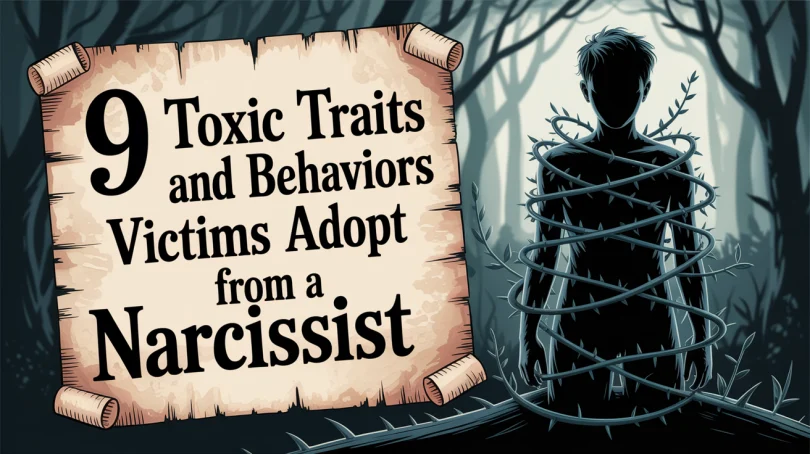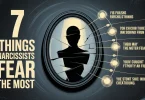Today, I would like to reflect on a somewhat uncomfortable subject: the negative traits and behaviors victims adopt from a narcissist while they are enmeshed in a relationship with them. I know from personal experience that admitting this has been happening is probably one of our greatest challenges.
However, co-narcissism does exist, and sadly, it also leads to the same or similar toxic and self-sabotaging behavior we witness in our narcissistic partners. Accepting uncomfortable truths is the only way we can overcome, heal, and move on in our lives.
Who Narcissists Target
Narcissists tend to target strong, intelligent, independent, and often very successful individuals who are, however, lacking something else in life. It’s not unusual for narcissists to put their hook into a person during their most vulnerable time, when they feel lonely or experience hardship, such as a personal loss or illness. Many victims are preconditioned from childhood, making them vulnerable to manipulation if they grew up with a narcissistic parent, for instance.
Once living with a narcissist as their partner becomes their new normal, victims subconsciously adopt some of their negative traits and behaviors as a coping or survival mechanism. The isolation they experience prevents them from being exposed to outside influences that could prevent a change in their behavior.
Stages of an Abusive Relationship with a Narcissist
I’ll try to list my points in the order they may occur in an abusive relationship with a narcissist, but everybody’s experience may be different.
1. Love Bombing and Magical Thinking
At the beginning of your relationship, when you get to know the narcissist, their most effective tools are to love-bomb and future-fake you. This is when you adopt the narcissist’s magical thinking and start believing in the fantasy world they pull you into. Yes, narcissists do think in this fantasy and see themselves as happy and successful in it. Why else do they have such a strong and resentful reaction when you confront them with your reality?
Narcissists are highly delusional and often still childlike in their approach to life. They need this fantasy to keep moving forward because their lives are built on hope for the better, and so will yours, the longer you stay with them. But hope is often a result of fear, and merely believing in hope without taking appropriate action gets you stuck in a cycle of endless misery. In reality, there is no improvement with a narcissist, ever, only a total downfall the longer you stay with them, at least for you.
Related Topics:
10 Ways Narcissists Use Future Faking to Manipulate Their Victims
3 Outrageous Narcissistic Traits
2. Erosion of Personal Boundaries
Speaking of love bombing, this leads me to my next point: you will adopt the narcissist’s problems with personal boundaries. Narcissists are prone to overstepping or tearing other people’s boundaries by sweet-talking or coercing them to do what they want.
However, they have difficulties maintaining personal boundaries because they tend to be naive and easily engage in dangerous behaviors that can lead to their demise or those around them. Narcissists often need to prove themselves in front of others, so this could include reckless actions such as driving too fast, dangerous s£xual practices, or irresponsible financial investments they get talked into.
3. Isolation and Antisocial Behavior
Once the narcissist has hooked you enough, they usually isolate you from your support system. This is when everything starts changing inside and outside of yourself. It’s at this particular stage where victims often adopt some of the narcissist’s antisocial behaviors while antagonizing the people around them. The narcissist pits them against friends or family members who recognize the narcissist’s bad influence on their loved one.
They create the perfect illusion of a Bonnie-and-Clyde relationship, where the mentality is “us against the rest of the world.” You will find yourself standing up and defending the narcissist and your relationship at all times. The narcissist doesn’t even have to do much to cause drama and division once they have you in place and become the sole center of your attention.
4. Resentment Toward Others
With that comes a lot of resentment toward other people, which is my next point. Narcissists hate and resent many people and hold grudges for the rest of their lives. They will also tell you a lot of nonsense about others, which isn’t always true. I remember my ex-partner always saying, “Having a grudge is like drinking poison and wanting the other person to die.” Of course, he only said this to get away with his bad behavior. Meanwhile, he had so much resentment and hate for his alleged enemies. They want to silence your feelings and judgment toward them in this way, but ultimately, they turn you into a very bitter and resentful person, just as bitter and resentful as themselves.
5. Triangulation and Jealousy
Once the narcissist has isolated you and made you all theirs, they suddenly start inviting other people into your relationship. Triangulation is a very sadistic tool in the narcissist’s repertoire, and of course, it’s only the narcissist who’s allowed to make new friends.
Deep down, they are fully aware they have nothing to offer and hide their feelings of jealousy, afraid somebody else could take you away from them at any time. Quite often, these third parties have no clue they are being triangulated, but notice your sudden shift in resentment toward them. It’s also one way for the narcissist to build their support system of “flying monkeys” to play the victim and make you look like the crazy one when they need it.
6. Insecurity and Low Self-Esteem
With that same jealousy comes a lot of insecurity. It’s wrong to believe that narcissists are full of self-confidence; they famously “fake it till they make it.” They’re, in fact, far from being confident, hence their constant need for power and control over others to boost and stabilize their low self-esteem.
When you’re with a narcissist, their constant criticism will provoke the same feelings of inadequacy, self-doubt, and low self-esteem in you that they have been dealing with all along. But it’s wrong to believe that destroying their partner’s self-confidence would be in any way beneficial for them; it ultimately only hurts them.
As I said before, narcissists target strong and independent people, and sooner or later, you will be reminded of that. However, due to trauma bonding and the erosion of your self-worth and self-esteem, you will first become dependent on the narcissist’s validation, just as narcissists are dependent on validation from others, even if they don’t like to admit it.
You turn from self-determined to someone who lacks their decision-making, and your fear of abandonment keeps you stuck, feeling like you can’t live on your own anymore, while in fact, you’ve been self-sufficient all along.
7. Hypervigilance and Paranoia
With your need to cling to the narcissist, their triangulation of you with others, and the multitude of other shady behaviors they display, it creates a lot of paranoia in you. The constant walking on eggshells around your partner makes you hypervigilant to your surroundings.
These are traits narcissists are all too familiar with because they don’t trust many people. Being in a constant fight-or-flight mode changes the structure of our brains. The amygdala, also known as the reptilian part of our brain, takes over to act on pure instinct as a means to survive.
Ultimately, narcissists will turn a formerly secure person into an anxious shell of themselves. It’s not uncommon to suffer from anxiety, depression, or post-traumatic stress as a result of the longer you stay with them.
8. Misdiagnosis and Complex PTSD
Unfortunately, many people suffering from complex post-traumatic stress (CPTSD) get misdiagnosed as having borderline or even narcissistic personality disorder themselves, sometimes because some of the traits mentioned before may overlap with their pattern of behavior.
While it’s true that narcissists often tend to suffer from CPTSD if their narcissism stems from having been raised in an abusive household, not every person with CPTSD is equally narcissistic.
I like to refrain from calling it a disorder because post-traumatic stress is not affecting you in the same way a personality disorder would. It’s a natural response to distressing and traumatic experiences anyone would have, and it is also very treatable.
While being triggered may lead to similar erratic or immature behavior, it’s crucial to recognize that the grandiosity and entitlement we predominantly find in narcissism are missing. You’ll most likely find yourself being a people pleaser and a giver, while narcissists are merely takers.
9. Fear of Intimacy
Last but not least, as a result of all of this, you may end up with a similar fear of intimacy as a narcissist. Survivors of narcissistic abuse who may have formerly been secure or anxious may develop an avoidant attachment style and keep relationships and closeness to other people at arm’s length.
Healing is essential to unlearn these fears and patterns and to realize that not everyone is out there to take advantage of you, that not everyone is a narcissist. Learning to trust yourself enough to draw a line when you see a red flag is paramount.
Open and honest communication is important to find the right partner who understands your initial trust issues and shows patience, compassion, and understanding so that you can learn to trust again.
Summary of Adopted Traits
In summary, victims adopt the narcissist’s fantastical thinking, their lack of boundaries, parts of their antisocial behavior, their feelings of resentment and jealousy toward others, their neediness and insecurity, their hypervigilant paranoia, symptoms of post-traumatic stress, and fear of intimacy.






